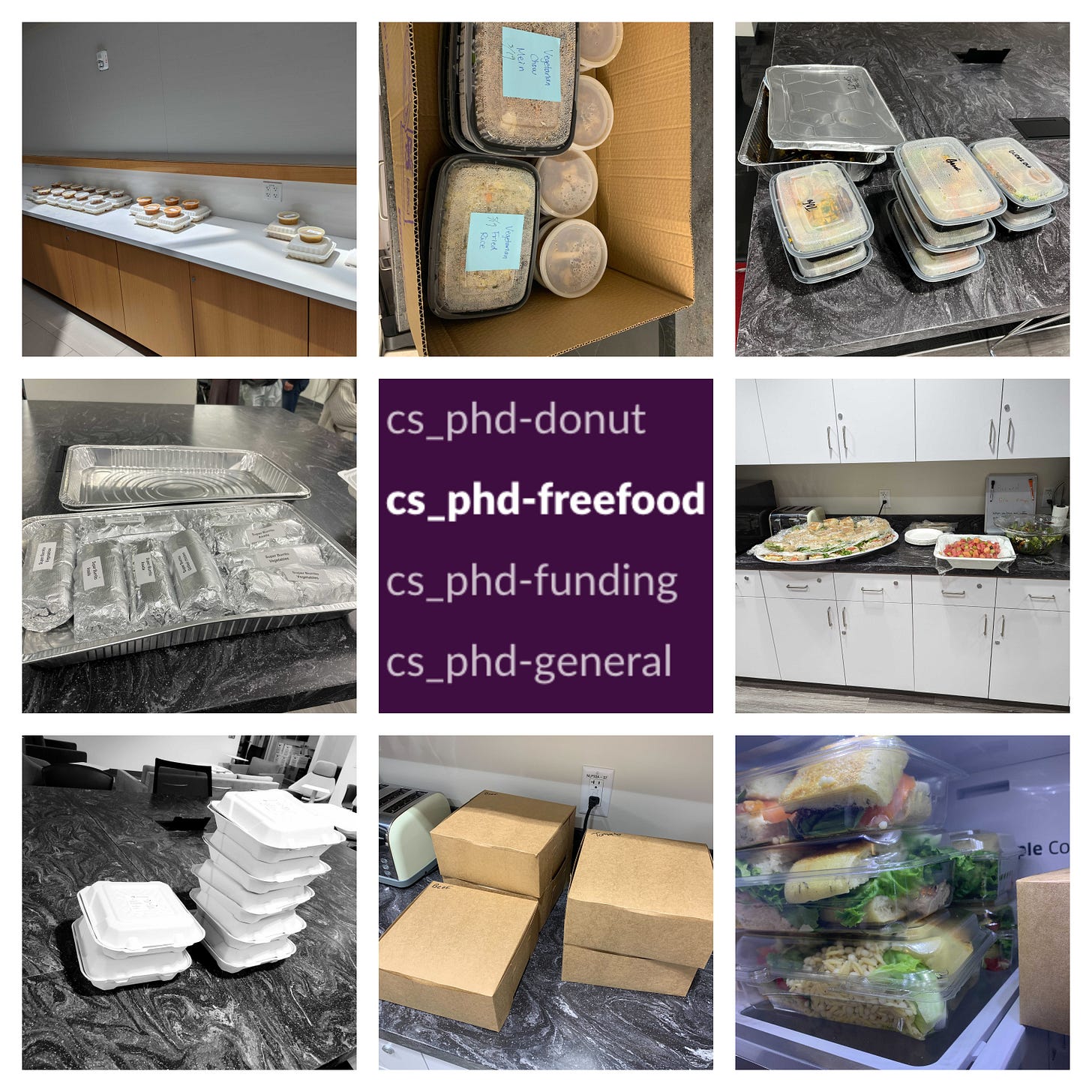How to have fun (as a Ph.D. Student)
When you hear the word “fun”, you might envision something along the lines of music festivals, spontaneous beach vacations, and late nights full of laughter with close friends. Doing a Ph.D. likely did not come to mind as a concept that exists in the vicinity of fun. The converse is also true. If you ask Ph.D. students what they prioritize, they might list several statement-of-interest-worthy objectives like growth, impact, and working on challenging problems. Fun for the sake of fun is probably not at the top of most students’ lists. Sure, for some students, research is indeed the one and only thing that rises to meet their definition of fun. But what about the rest of us who love our research but also seek out joy and entertainment outside of our office buildings? Is having fun a possibility for Ph.D. students? Where are the fun Ph.D. students hiding and how can we become one of them?
The case for prioritizing fun
Some Ph.D. students are notably anti-fun. They believe that these years are for grinding out papers, fighting to be more impressive than their peers, and landing impressive internships. Working hard is indeed important but perhaps having fun and working hard are not mutually exclusive. Moreover, enjoying yourself when spending the time you spend outside of the lab is not a moral shortcoming nor a waste of the amazing opportunity you have been given. My hot take is that competing in the “Suffering Olympics” to see who is suffering more through overwork is really not necessary for producing good work. Taking breaks and seeking out experiences we enjoy only makes us more resilient in our journey and helps us develop an identity outside of our work. This pandemic has made all of us realize that our time on Earth is limited and our youth is even more limited. So why not make every year, every semester, every weekend, and even every day as fun as possible?
Preliminaries: F-U-N
There are many different lenses through which you can examine the concept of fun. Fun is inherently subjective to the experiencer. Here are some common perspectives one might examine fun through:
Type I fun vs Type II fun: As popularized by the more outdoorsy among us [1], we can categorize instantaneous, gratifying-in-the-moment fun like eating yummy food or binging your favourite show as Type I fun. Type II fun, on the other hand, involves suffering in the moment but satisfaction afterward. This type of fun might include a long run, a difficult climb, or… perhaps… finishing a Ph.D.?
Consumerism-driven Fun: There is a type of fun Instagram and our more well-off friends sell us: ski vacations, Vegas day clubs, or spontaneous world travel. All of these Insta-worthy fun moments also require copious amounts of money that our graduate student stipends might not provide. Most of us made the conscious choice of forgoing unchecked consumption to pursue work we thought to be the most challenging and meaningful.
Numbing Fun: When you face a lot of stress in everyday life, numbing your stress and quieting your mind might be considered very fun. The mechanism for achieving numbness or distraction also varies from person to person. This kind of fun is one you must stay wary of. It is probably for the best not to become too dependent on this type of fun.
Skill-gaining Fun: Ph.D. students love being good at things. Even when trying out new hobbies they might get aggressively competitive and try to improve as quickly as they can. The confidence we get from seeing ourselves become measurably better at something outside of research is wonderful. While it is unclear if our efforts at becoming a better tennis player/climber/surfer mean anything in the grand scheme of things, it sure feels satisfying to keep progressing.
Creative Fun: In a world of consumption, scratching the itch to create new things feels wonderful. Whether it is writing or baking or filming a TikTok or making an NFT on your Sunday mornings, channeling creative energy by bringing a new idea to life can be incredibly fun. This type of fun can also be a slippery slope; if you are not careful, you might turn it into your side hustle. ;)
Techniques: How to be more fun:
Now that we have looked at some different ways to think about fun, I have three suggestions, for grad students specifically, to have more fun. If you are already having too much fun doing your Ph.D., feel free to skip to the next section.
1. Reframing the mundane
Even though your routine is what is helping you achieve your academic goals, there might be a fair bout of repetition in your routine. But you can always still find fun by gamifying the small things you do during the week like trying to find free food every day or coupon clipping at your grocery store (you can save more than 50% at Safeway sometimes). If fun for you is more about non-competitive enjoyment, long walks late at night in Target (“tar-jay”), or doing a new dance workout might turn your to-do list of groceries and exercise into something exciting that you look forward to! Think about your daily routine and find or add something that you eagerly anticipate (it is okay if the answer is: “FREE LUNCH”).
2. Pushing past your comfort zone fun
Most students come into the program with a specific level of seriousness. I am on an intellectual pursuit, I am trying to make something of myself. But most of us doing this Ph.D. are in our 20s; a fluid and unpredictable period of our lives where our personalities are still forming and developing [2]. Seeking out new experiences that are contrary to everything we believed ourselves to be can be oddly fun. Maybe you are a strong introvert for whom the idea of doing improv seems unimaginable. Maybe you are an absolute clutz who dropped out of ballet class early in life. Maybe you are an indoor person who may be allergic to the sun. Whether it is trying something unexpected or returning to something you have long ruled out, venturing out on a journey takes courage but can broaden who we imagine ourselves becoming. There is something inherently fun about seeing everything as a possibility and feeling limitless when we reflect on who we are. The Ph.D. is about growth so why not dwell in the fun of growing in directions we never imagined?
3. Making the time for fun
While the rest of your schedule is likely very optimized, scheduling 15 minutes twice a week to “have fun” might leave you at a loss for creating moments where you are truly enjoying yourself. While you can do fun things while taking a break from work, it is terribly difficult to have fun when just trying to finally catch your breath. Give yourself time to potato and contemplate what might be fun for you in a given moment or season of your life.
Final thoughts: fun vs happiness
There are still larger questions that remain: How many fun things do you participate in before you become a fun person? How many fun adventures do you go on before you are happy? While we want to be intentional about prioritizing our happiness, we don’t want to fall into the trap of trying too hard to live up to external measures of fun. Questions of identity are better answered via introspection than via external validation. If dancing in your kitchen that one time three years ago made you feel fun, then you are indeed a fun person! Be kind to yourself while you sail towards happiness and be patient with yourself if it takes longer than you imagined when you discover that this path is not linear.
Thanks for reading! :)
Notes:
[1] The Fun Scale, Kelly Cordes https://kellycordes.com/2009/11/02/the-fun-scale/
[2] The Defining Decade, Megan Jay https://megjay.com/the-defining-decade/
Acknowledgments:
Thanks to everyone who encouraged me to write this post. Special thanks to Rishi Bommasani, Kaylee Burns, Josh Kazdan, Simone Masserini, and Rohan Taori for giving me helpful comments and feedback during the writing process.





